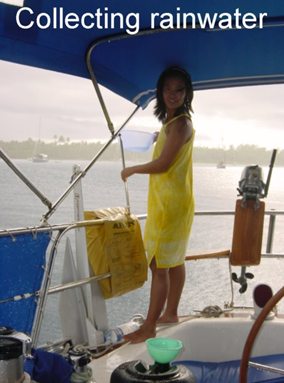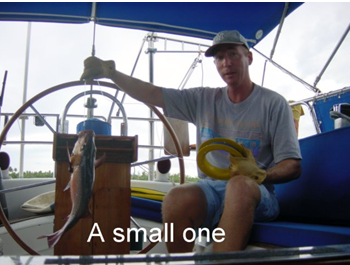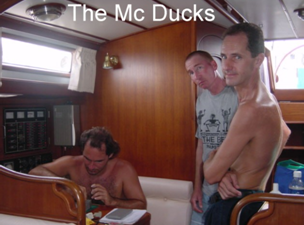- Boat
- Articles
- About
- Tehani-li Logs
- 2004
- Uligan Maldives
- Man, Oh Man, Oman
- Eritrea: The Nicest Place You’ve Never Heard Of
- Cruising Notes: Oman to Eritrea – From Pirates to Cappucinos
- Old Testament Sudan
- Egypt: Legend, Myth and Reality
- Thoughts on Cruising the Red Sea
- Greece: Civilization Again
- Montenegro
- Malta
- Sardinia, Italy
- Barcelona, Spain
- 2003
- 2002
- 2001
- 2004
- Contact
Chagos in June
The Maldives are fantastically beautiful. We were visibly impressed with the clarity of the water (no pun intended) and the incredible variety of brilliantly colored fish. Wherever we went the locals were invariably friendly and soft spoken. You can’t even get into an argument with a taxi driver here. True, we did not go to any resorts so we can only pass on what we have heard; they are supposed to be top-notch.
Well, we finally made it below the equator and on to the Chagos Archipelago, the mythical “Yachtie Paradise/Garden of Eden.” There is no denying Chagos, smack dab in the middle of the Indian Ocean, is supra-beautiful, even supernatural.
We spent two months in Salomon Atoll, anchored at 05 21.290 S, 72 12 739 E off Boddam Island. There are short stretches of white sandy beaches and definitely no end to the pretty swaying coconut trees leaning out over gin-clear waters teeming with rainbow colored fish. The atoll itself is flat and the vegetation is dense, mostly pretty coconut and casurina trees.
Photo courtesy of S/V Aku Ankka
The weather is idyllic with only occasional rain showers and squalls (it actually got a lot worse in July but I didn’t know that then). We collected rainwater for doing laundry by hand. That was Ariel’s job. My job was to keep the watermaker going so we had enough shower and drinking water on board. There are wells on some of the islands, including Boddam, where we could get water if it didn’t rain and if the watermaker conked out

The fauna includes some mosquitoes, but not many, some friendly rats and countless coconut and hermit crabs. The hermit crabs are bright red, or white, and grow to fist size. The coconut crabs on the other hand grow to frightening proportions with huge coconut-cracking (or ankle-breaking) claws. They can grow up to THREE FEET across! I guess you could ride one around the jungle but we never saw any that big, nor wanted to.
The fishing is good. Most cruisers here catch fish trolling from the dinghy just outside the atoll and have been known to catch yellowfin tuna, wahoo and bonito. I emphasize the word “most” as we have been skunked every time we tried. I tried trolling in the mornings, in the afternoons and in the evenings.
I tried fast trolling and I tried slow trolling. I tried rubber squids, red and green and rapalla lures. I tried Mondays, I tried Sundays. I tried religious holidays. It didn’t matter, nothing worked. Some of the “old timers” here (boats that have come back year after year) claim this year the trolling isn’t what it used to be, a small consolation. But hey, we are not fish-free.

I have had great success catching huge snappers (three feet long) under the boat using bait. They only seem to bite when it is calm and just as the sun sets but before 7:30 PM. Don’t use a wire leader as they are extremely suspicious. You can get smaller ones in the morning but not too early, around 8 AM, if you are lucky.
The problem with catching fish at night is you have to clean them at night in the cockpit, which I do (Ariel won’t have anything to do with that part). But since I have to swim under the boat on a regular basis to clean the bottom I don’t throw the carcasses overboard. I am loathe to encourage the resident big and toothy shark population to associate our boat with free snacks.
I follow the same credo camping in bear country; keep the food out of the camp. So we have to let the guts rot in a bucket overnight until I can dump them by the shore in the morning. Yes, they DO get rather ripe after just one night in the tropics! What is really interesting/unnerving is what happens when you dump the stuff into the water off the small stone jetty on shore. Then the big and toothies come out of the woodwork to make short work of it all.
It is a National Geographic feeding frenzy in 6 feet of crystal clear water right at your feet. I would guess on average you would see 10 sharks or so instantly appear. We keep our toes out of the water there.
Sadly, we had to say goodbye to our good friends, Dave and Ann on Ferric Star. We decided we liked Chagos so much we wanted to stay longer which meant missing our weather window to Seychelles and Africa. Who cares? That’s how it goes, you have to be flexible. Dave and Ann spent a month here and decided to push on west. They are in the Seychelles now after a hellish trip over.
It seems this year everyone has had a bad passage from Chagos to the Seychelles. Their plan is to round S. Africa and make it to Capetown by Christmas then do the long haul across the S. Atlantic to Brazil in time for Carnival. That’s a lot of miles to cover in only a few months and it means very little time to see or do anything other than drop the anchor one night and move on the next day.
We are not so keen on being rushed. I would like to try that trip either earlier in the season when you have more time but “we” would want to spend a year in Africa. However, Ariel, the original mosquito magnet, vetoed the year in Africa idea so now our plans are to head EAST back to Thailand and then make a shot for Europe via the Red Sea next year. Oh well. We have cruised with Ferric Star since Malaysia and had some good times together. At least we can keep in touch on the HF radio.

Steve and Matthias on McDuck have been particularly helpful fixing our computer, Sailmail connection and autopilot while we were here. They are two electronic geniuses that bought their boat, a 33 foot Dean Catamaran in Tanzania and are heading to Thailand. Steve is English and Matt is from Germany. They are best of friends and used to run an electronics company in Dar in Tanzania for 6six years.
They came to Chagos for two weeks and stayed three months. Not an uncommon story. One boat, Mariposa, has been here for 18 months! Matt was able to fix our computer, several times. Steve not only brought the all important autopilot back from the dead, but also fixed my HF radio, which we rely upon for email and weather info.
We paid them in food. Ariel cooked dinners, made cakes and pies and things they definitely didn’t have but appreciated. In fact, the only thing supplies they had enough of was – beer! So it was a good trade for all of us. When they weren’t fixing things on our boat they could be found on other boats in the anchorage fixing stuff as well. The McDucks were always welcomed wherever they went. Nice people too and great volleyball players (important attributes in Chagos).


